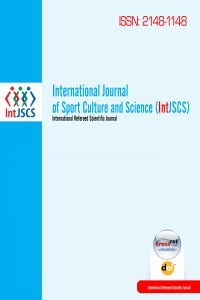Determining Awareness Levels of Benefits of Sports in Individuals with Autism with Regards to their Families and Private Education Teachers
The purpose of
this study was to determine the levels of awareness by families and private
education teachers regarding individual benefits of sportive events realized
with the aim to facilitate the lives of individuals with autism. In the
research as data gathering tool, “Personal Information Form” that is developed
by the researchers and “Awareness Scale aiming for the impacts of sports in
individuals with mental disabilities (ZEBSEYFO)” being developed by İlhan and
Esentürk (2015) was used. Research population was composed of 187 people living
in the cities of Zonguldak, Bartın and Karabük, 74 of which are parents having
individuals with autism. According to the findings obtained from SPSS 21
package program in the study, when gender variable is handed with respect to
the family, it was determined that difference between the levels of scores
obtained by female and male participants (mothers and fathers) from ZEBSEYFO
was at a meaningful level in favor of female participants as statistically
(U:271,000; p<0,05). According to the findings obtained, it was determined
that as per the educational status of participants, difference of ZEBSEYFO
scores between educational levels was statistically meaningful and a meaningful
difference was found in the awareness level of parents who were not literate
(0,038) (p<0,05). As a result of these findings, it was determined that
awareness level of mother in a family having an individual with autism was
higher and that awareness level of parent not being literate was higher.
Keywords:
Autism Private Education Teacher, Parent, Sports, Awareness Level,
___
- Ciarrochi J, Chan EY, Bajgar J (2001). Measuring emotional intelligence in adolescence, Personality and Individual Differences, 31 (7): 1105- 1119
- Goldenberg I, Matheson K, Mantler J (2006). The assessment of emotional intelligence: a comparison of performance-based and self-report methodologies, Journal of Personality Assessment, 86 (1): 33–45
- Goldberg S, Morris P, Simmons R J (1990). Chronic illness in infancy and parenting stress: a comparison of three groups of parents, Pediatric Psychology, 15:347-358
- İlhan L (2010). The effect of the participation of educable mentally retarded children in the special physical education classes upon the anxiety levels of the parents of the children Ovidius University Annals, Series Physical Education and Sport / Science, movement and health, 10(2) pages 304-309
- İlhan L, Esentürk O (2015). Development study regarding Awareness Scale in mentally disable individuals relating with the impacts of sports (ZEBSEYFO), CBU Physical Education and Sports Sciences Journal 9(1), pages. 19-36.
- Öner N (1997). Validity of continuous concern inventory situation in Turkish Community, Ankara: Thesis for Associate professorship.
- Özbey Ç (2005). Autism and training of children with autism, Journey to the country of loneliness, İstanbul: İnkılâp Publishing House.
- Özbey Ç (2009). Special children and therapy methods, biomedical, psychological, and attitude based training, treatment and therapy methods being applied for children with autism, hyperactivity, down syndrome, and mental disability, İstanbul: İnkılap Publishing House.
- Özer-Sevimay D (2001). Physical education and sports for disabled individual. İstanbul: 1nd Ed., Nobel Publishing House.
- Tufan İ (2006). Are autistic children genius or are they disabled? İstanbul: İletişim Publishing House.
- Turan A (2005). Children talking with the love language, Guidance book for language development and disorders relating with down syndrome, autism and stuttering, System Publishing House.
- Vural İ (2007). Training of children with autism and lack of communication, İstanbul: Evrim Publishing House.
- ISSN: 2148-1148
- Başlangıç: 2013
- Yayıncı: Uluslararası Bilim Kültür ve Spor Derneği (UBİKS)
Sayıdaki Diğer Makaleler
Bircan DOKUMACI, Cihan AYGÜN, Demet DEMİR DOĞAN, Hayriye ÇAKIR ATABEK
Mehmet GÜNAY, Elif ÖZ, İmdat YARIM, Ebru ÇETİN
İ. Bülent FİŞEKÇİOĞLU, Arif ÖZSARI
Arslan KALKAVAN, Mehmet ACET, Gökhan ÇAKIR
Zeynep EROL, Gizem ÖZDEMİR, Mehmet GÜNAY, Taner BOZKUŞ
Aristotelis GIOLDASIS, Athanasios SOUGLIS, Orestis CHRISTOFILAKIS
